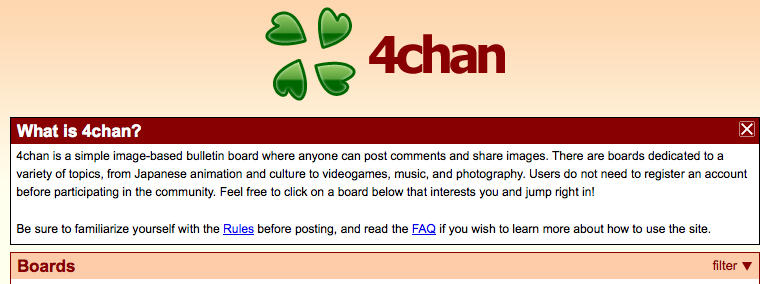By BARBARA ORTUTAY
The Associated Press
SAN FRANCISCO (AP) —
Clicking on the website 4chan’s “random,” or “/b/” subsection will take you to a place very far from the polished vacation photos on Instagram and the adorable baby snapshots on Facebook.
Here, you might find close-ups of genitals, lots and lots of breasts, or a post on why one should never marry a woman who isn’t a virgin.
There are also images of a dead woman.
Authorities say it was the slaying suspect, David Kalac, who posted the pictures and wrote the accompanying posts about strangling the woman and his plan to be fatally shot by police.
4chan’s roots date back to a pre-Facebook age on the Internet, where anonymity ruled and rules were few to come by.
The site is where hackers deposited nude celebrity photos over the summer.
It’s also the birthplace of the hacker collective Anonymous, along with countless funny Internet memes and harmless pranks on celebrities. It’s been called a home to cyber bullying as well as do-gooder vigilante justice.
“Often dismissed as little more than a gang of anonymous bullies, there is some truth to the notion that the site is simultaneously the best and worst of the Internet,” journalist Sean Bonner wrote on BoingBoing.net in 2010 in a story about 4chan helping track down a woman who put a living cat in a trash bin.
Some questions and answers about 4chan:
HOW DID 4CHAN START?
The site was born in 2003, a year before Facebook, as an image and message board in the style of a similar Japanese board called 2chan, or Futaba.
The identity of its 15-year-old founder, Christopher Poole, became widely known after he gave an interview to The Wall Street Journal in 2008 in an article titled “Modest Web Site Is Behind a Bevy of Memes.”
Poole wanted to create a version on 2chan for American audiences to share his fascination with Japanese comics and television shows, the Journal said.
Soon, the site grew well beyond anime and manga, thanks in large part to the fact that it allows users to be anonymous.
It became a place for people to share images and discuss common interests, from TV shows to computer science to pornography.
At a time when Facebook, Google and to some extent Twitter are pushing people to share their real identities, 4chan lets users post without giving a name or even an email address, adding to its appeal.
WHY DOES 4CHAN ALLOW GRAPHIC IMAGES TO STAY UP?
4chan’s rules prohibit people from posting things that violate U.S. or local laws. It’s also against the rules to visit the site if you are under 18.
Users can report posts that violate 4chan’s rules and there are moderators who can remove content. But the site prides itself in not censoring content just because it might offend some people.
“Generally the rules are as light as they can keep them,” said Jim Hendler, a computer science professor at the Rensselaer Polytechnic Institute in Troy, New York.
On the other hand, people do break 4chan’s rules, but in general the site is “very skittish” about taking down content, said Rob D’Ovidio, an associate professor of criminal justice at Drexel University in Philadelphia.
“It is an environment where independence and user-created community is highly valued over strong editorial control,” he said.
The posted photos of the woman’s nude, lifeless body, while distasteful, don’t violate any laws, D’Ovidio said.
“It’s not like he stole crime scene photos,” he said, referring to Kalac, who’s accused of killing his live-in girlfriend. The pictures also don’t violate copyright laws since he “technically owns the intellectual property.” In essence, 4chan would have to decide to remove the images on its own volition, or be compelled to do so by law enforcement.
And even if 4chan were to remove the photos, chances are they would appear elsewhere on the site, or on the Internet.
“Once the cat is out of the bag, it’s difficult to rein it back in,” D’Ovidio said.
WHAT ELSE IS ON 4CHAN?
The site’s “random” board gets the most notoriety, but it’s just a “small part of a much larger entity,” Hendler said.
“Despite the infamy, it really does some positive things. It creates community,” he said, adding that 4chan remains very much user-focused in the most basic sense of the term. The site “wanted to stay most true to the notion that you could be anonymous, you could talk about whatever you wanted, that you could control the conversation.”
Paul Levinson, professor of communications and media studies at Fordham University, called 4chan the “merry pranksters of the Internet.”
In 2010, for example, users tried to send Justin Bieber to North Korea by flooding an online poll asking fans where the divisive singer should perform next. It did not work.

